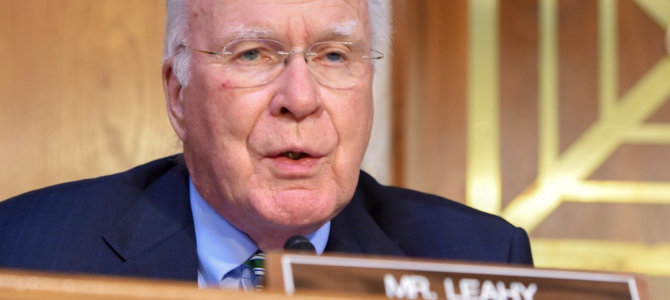
With House Republicans having voted by secret ballot last Wednesday to remove a ban on earmarks within their caucus, capitulating to Democrats’ wishes to reintroduce the practice, that leaves the Senate GOP as the last remaining bulwark between American taxpayers and corrupt congressional spending and pet projects. By the looks of it, that last line of defense is planning to cave.
The Federalist has obtained the proposed GOP conference rules, which would allow for earmarks, which have been banned since 2011 and are now being pushed under the monikers “member-directed” or “congressionally directed” spending. If senators successfully pass their proposed rules, lawmakers will be able to use chunks of taxpayer dollars, allocated as discretionary spending, to fritter away in their home states, congressional districts, or localities, without going through statutory processes.
All that frittering adds up. Congress has given out more than 111,000 earmarks costing nearly $376 billion since 1991, according to the taxpayer watchdog group Citizens Against Government Waste.
The most conservative lawmakers have traditionally opposed earmarks, calling them “tools of the DC swamp” and the “currency of corruption.”
This is a mistake.
Earmarks are tools of the DC swamp and Republicans should not participate. #NoEarmarks #DrainTheSwamp https://t.co/jPq6m8BHh8
— Congressman Ted Budd (@RepTedBudd) March 17, 2021
Earmarks are the currency of corruption. The @freedomcaucus opposes earmarks, whether in the 117th Congress or any future Congress.https://t.co/eIrwoOE7gG
— House Freedom Caucus (@freedomcaucus) February 25, 2021
Most current members weren’t in DC during earmarks and don’t know how it will change how Capitol operates. It will consume their offices time on parochial issues & explode the number of DC lobbyists begging for $$. Billions of $$ will be wasted someone will end up in jail again.
— Jim DeMint (@JimDeMint) March 7, 2021
“We cannot imagine a worse way to build back trust in Congress than to resurrect a system that has been roundly rejected as corruptive and wasteful for decades,” a group of GOP lawmakers wrote to Sen. Patrick Leahy and Rep. Rosa DeLauro, who chair the Senate and House Appropriations Committees, respectively. “After four years of a president who promised to ‘drain the swamp,’ Democrats seem intent on filling it up with pork-barrel spending in the form of earmarks. Bringing back earmarks would be a grave mistake for Congress and future generations of taxpayers.”
The first page of the rules, which the conferences votes on each year, lays out in Senate-speak whether those rules, if passed, will be binding on all members. It refers to the “History, Rules & Precedents of the Senate Republican Conference” to say that no actions the Republican conference takes on any Senate matters are binding on how members cast their votes.
While this page offers context that might give the appearance of an effort toward bipartisanship or negotiation, it fails to answer several basic but pivotal questions, such as: Can members be forced to take earmarks? Or can senators decide to take earmarks even if the conference has banned it?
According to the rules, earmarks must be “included primarily at the request of a senator,” and while this meaning has been open to interpretation over the years, Senate leaders are now purporting “to craft logical, clear, and uniform guidance as to what types of funding requests” fall into this category. The proposed Senate GOP conference rules say the following sorts of requests are not “included primarily at the request of a senator”:
- Anything that Congress has previously authorized to be funded;
- Any item included in the president’s budget request or supporting documents, regardless of the funding level requested by the administration;
- Any project or program that is subject to a statutory or administrative competitive process, to include prior conpetitive awards; or
- Any request for an existing federal facility, regardless of whether it is included in the president’s budget request, provided that the funding would allow the facility to maintain current/existing operations.
If an item falls into the acceptable earmark category, however, according to the proposed rules, it is subject to the following disclosure requirements:
- The chairman must disclose congressionally directed spending items that are included in the bills or reports, certifying that any such items are “identified through lists, charts, or other similar means, including the name of each Senator who submitted a request to the committee for each item so identified; and that the information has been available on a publicly accessible congressional website in a searachable format at least 48 hours before a vote.”
- Senaators must disclose information to the committee about all of their requests for congressionally directed spending items, “provid[ing] a written statement to the chairman and ranking member of the committee of jurisdiction, including the name of the Senator; the name and location of the intended recipient or, if there is no specifically intended recipient, the intended location of the activity; the purpose; and a notification that neither the Senator nor the Senator’s immediate family has a pecuniary interest in the item.” The chairman must make public senators’ certifications that they have no pecuniary interest.
- Although Rule XLIV only requires the chairman to disclose congressionally directed spending items that are included in the bill or report, [the committee chairman] has decided that senators must post their disclosures to the committee about all of their requests (all information in #2 above) on their official websites.
“This is consistent with how the House is operating,” the proposed rules continue, “and while it is not required, it will be difficult optically to not follow the same approach.” This approach — however “optically” convenient — leaves gaping loopholes and exceptions to disclosure requirements.
Furthermore, the proposed rules dictate that in the 2022 fiscal year, earmarks will be capped at 1 percent of total discretionary spending. This 1 percent gets evenly divided between the House and Senate, with the upper chamber’s half being divided evenly between Democrats and Republicans, distributed among subcommittees.
While discretionary spending has not yet been decided for 2022, based on the numbers from 2021, 1 percent of discretionary spending would have meant about $15 billion being divided between the two chambers of Congress, with $7.5 billion going toward House earmarks and the same amount going toward Senate earmarks. “In total, Senate Republicans and Senate Democrats each would have controlled $3.75 billion” in earmarks, the proposed rules say of 2021 estimates.
The rule proposal specifies, however, that “[t]his cap is not statutory nor derived from Senate rules; it is self-imposed,” meaning this is just the beginning. The amount designated for earmarks is subject to rise in the future.
This is not only because of the inevitable rise in overall spending year to year, but in the uncapped percentage of discretionary spending that can be allocated to earmarks. This is simply one way in which congressional earmarks usher in a culture of corruption and enable so-called public servants to exploit the hard-earned dollars of taxpayers to fund their pet projects and to score political points.
Worse than that, however, is the reality that earmarks allow congressional leaders to force submission from the more moderate members of their caucuses — a recipe for strict partisanship and progressive bullying in such a narrowly divided Congress. For an example, look no further than one of the most famous earmarks: the “cornhusker kickback” in 2009, which gave special Medicaid expansion perks to Nebraska to win its senator’s support for the Democrats to reach 60 votes. Without this earmark to the Affordable Care Act, Obamacare wouldn’t have passed.
“[T]he 2000s were marred by infamous earmarks like the Alaskan ‘Bridge to Nowhere,’ an indoor rainforest in Iowa, a Teapot Museum, and absurd research projects like one analyzing goth culture,” said the aforementioned letter from conservative GOP lawmakers. “The wide-spread practice of earmarks was corrupting. Earmarks were used to buy and sell votes and reward favors. Earmarks brought discredit on the House and Senate and ultimately led to several Members of Congress being convicted on corruption charges.”
“In order to restore public trust in Congress, the practice of earmarking was officially put on a moratorium in 2011 under Republican leadership,” the GOP lawmakers noted. Now as citizens’ trust in Congress remains low and partisan tensions are high, restoring earmarks would do nothing but turn up the temperature yet more.







